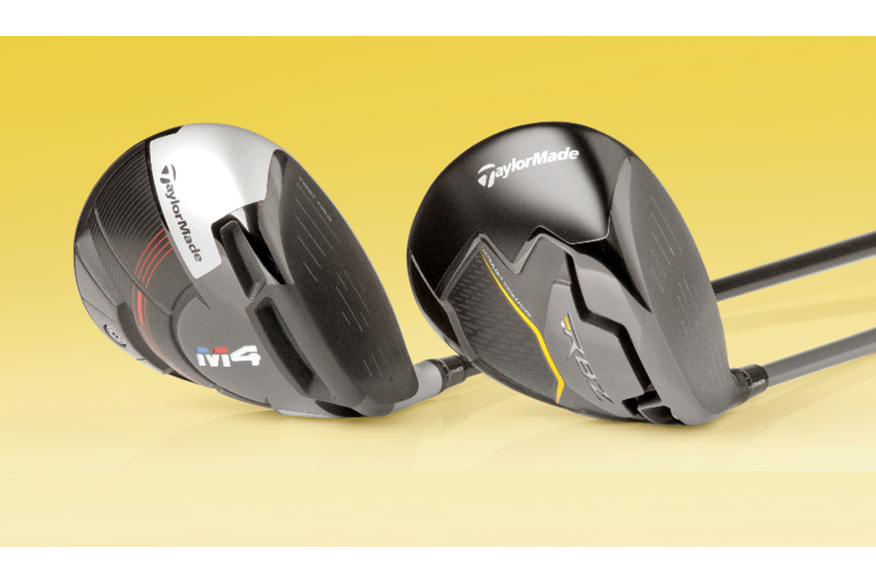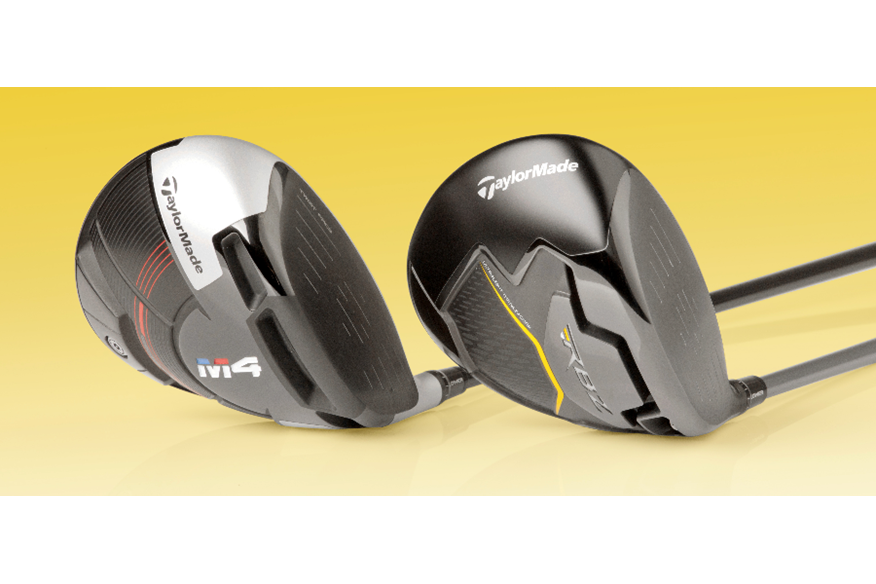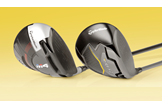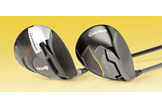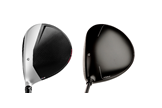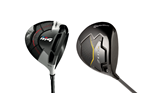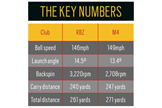TESTED: TaylorMade’s M4 vs RBZ Black
Last updated:
One is a 2018 Tour winner, the other is a retail special… So how do they compare?
TaylorMade’s current M3 and M4 drivers are played by many of the game’s biggest names including Rory McIlroy, Dustin Johnson, Justin Rose, Jason Day and Tiger Woods.
But for all the hype these two clubs have generated in 2018, they aren’t TaylorMade’s only new 2018 models.
Walk into any American Golf shop across the UK and you’ll find the M3 and M4 sat on a rack right next to a reincarnated RBZ Black driver, one of golfers favourite drivers from a few years ago.
Yet you won’t find any mention of it on TaylorMade’s website (either in the UK, Europe or USA) or see it on tour. So why has is been launched?
It’s hitting a price point, giving golfers the chance to buy a brand new TaylorMade big stick for less than £240 (a new M4 retails at almost £370). But is it any good? And who does it appeal to? We wanted to find out by testing the RBZ and an M4 back to back.
How we did it
We asked American Golf to let us borrow an RBZ Black for our test. We got our pro Ben Frost to hit both the RBZ in its stock, stiff shaft against the M4 with its stock, stiff shaft. Our launch monitor gathered the data, and thanks to our pro’s repeatable swing we were able to accurately compare both models. After all shots were hit we analysed the data to see how each performed.
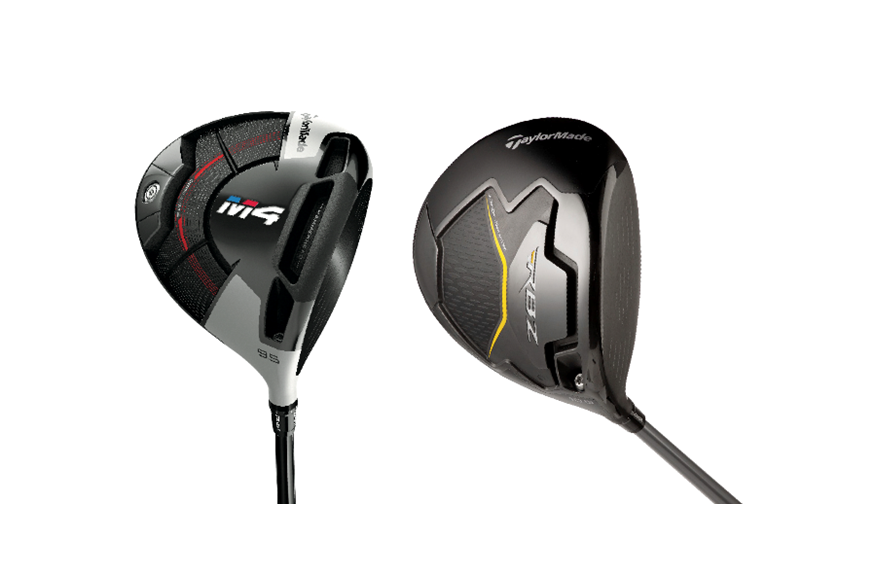
The details
M4 – Price: £369 Lofts: 8.5°, 9.5°, 10.5°, 12° Stock shaft: Fujikura Atmos Red 5
RBZ Black – Price: £229 (only at American Golf) Lofts: 10.5° or 12° Stock shaft: Matrix White Tie MFS 55
How the RBZ compares to M4
TaylorMade’s original RBZ was one of our favourite all-titanium drivers, ever. So it’s no surprise they’ve resurrected the name for American Golf and other large retailers who know there’s a big market out there for a £200 drivers.
On raw numbers alone the RBZ holds up pretty well against a proven tour winner in the M4.
Ball speed was 3mph slower, which isn’t terrible – but it’s not great if you’re trying to rinse every last yard out of your game. The RBZ also launched higher with more spin, which is the same equation the best club designers try to balance through clever weight positioning in premium drivers. But all in, a carry distance seven yards down on the M4 (total distance was 10 yards shorter) isn’t disastrous, and for some golfers would be a worthwhile trade-off for keeping an extra £140 in their pocket.
Our test pro said the sound from the RBZ was solid for an all-titanium head (with no carbon-fibre to absorb vibration like the M4), and it sits really nicely at address.
See our 2018 drivers test here
Does TwistFace actually work? Three testers found out
You pay more for the latest tech
As loudly as TaylorMade beat the drum about the benefits of carbon crowns for freeing up useless weight (and dampening vibration) in the M4 and M3 drivers, the RBZ doesn’t have a carbon lid. Why?
Because by using titanium, costs can be controlled, enabling both TaylorMade and American Golf to hit the all-important price point. Don’t expect to find Twist Face or a Hammerhead slot like the M4 either; that’s TaylorMade’s very latest tech, reserved for their premium big sticks.
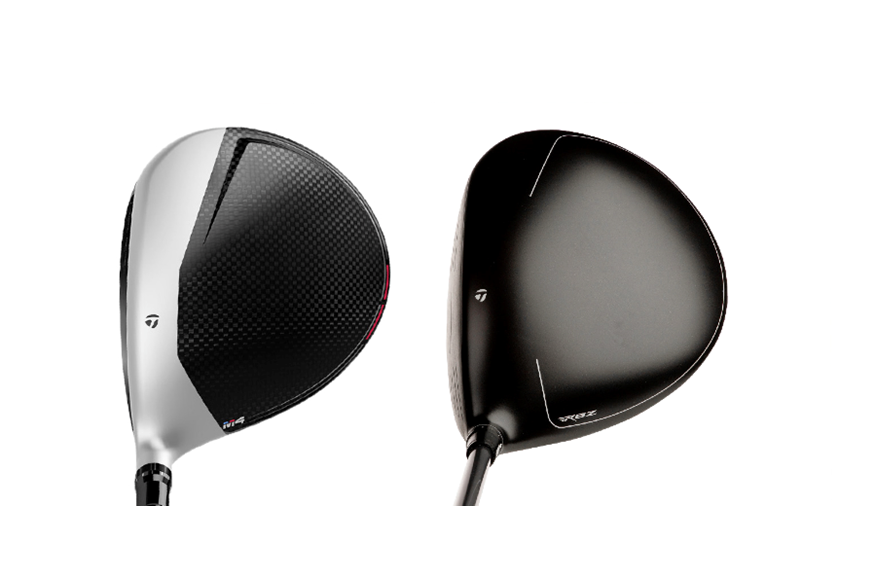
How different are they?
Read the RBZs description on American Golf’s website (and Dicks Sporting Goods in the USA) and there’s absolutely no mention of whether the head’s cast or forged. But with forging (for drivers, not irons) being cheaper than casting, it’s probably a safe bet to say the RBZ’s head is forged. What does it mean to you?
Cast heads like M4 (and most premium drivers) have a skeleton cast from molten titanium, which allows liquid to run into very intricate shapes and designs, which forging (essentially stamping into shape) can’t achieve. Forged heads usually come in four pieces and need welding together, and these welds position mass in areas designers/engineers really don’t want it. That’s why there’s no visible weight positioned on the RBZ’s head, because thanks to the heavy welds there isn’t any left to position to influence launch, spin or shot bias.
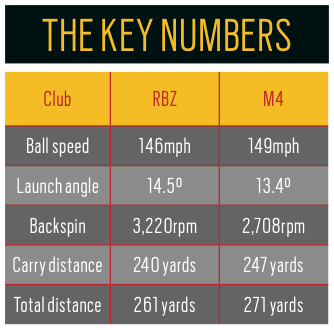
Shaft question mark
Do a search for the Fujikura Atmos 5 shaft in the M4 and you’ll find the shaft’s specs on the company’s website. But for the Matrix MFS White Tie X4 in the RBZ you won’t find a single shaft on either the TaylorMade or Matrix website with the same name. It means the specs could be anything, even though the paint job might look similar to other models in their line. And if the specs could be anything, how do you know if it suits you or not?
How does the M4 compare to the Ping G400 MAX and Callaway Rogue?
Our verdict
We know there’s a good number of golfers who don’t want to pay much more than £200 for a new driver, whether Rory uses it or not. So if TaylorMade doesn’t make a club to fill the gap (even though it doesn’t feature their latest tech) there are plenty of other brands who will. Looking at both drivers on paper there isn’t a huge gap between these two. But the tech TaylorMade’s engineers spend hours developing for their premium clubs does make a difference (no matter how big or small) – and it comes at a cost.
For less serious golfers who don’t want to spend a fortune, there’s absolutely nothing wrong with the RBZ. It looks good, plays well (even if there aren’t lots of options when it comes to lofts and shafts) and it’s more than capable of doing a job for plenty of club golfers. But for anyone who takes their game seriously, there’s no getting away from the fact that premium drivers like the M4 offer ultimate performance, which rightly comes at a cost.
